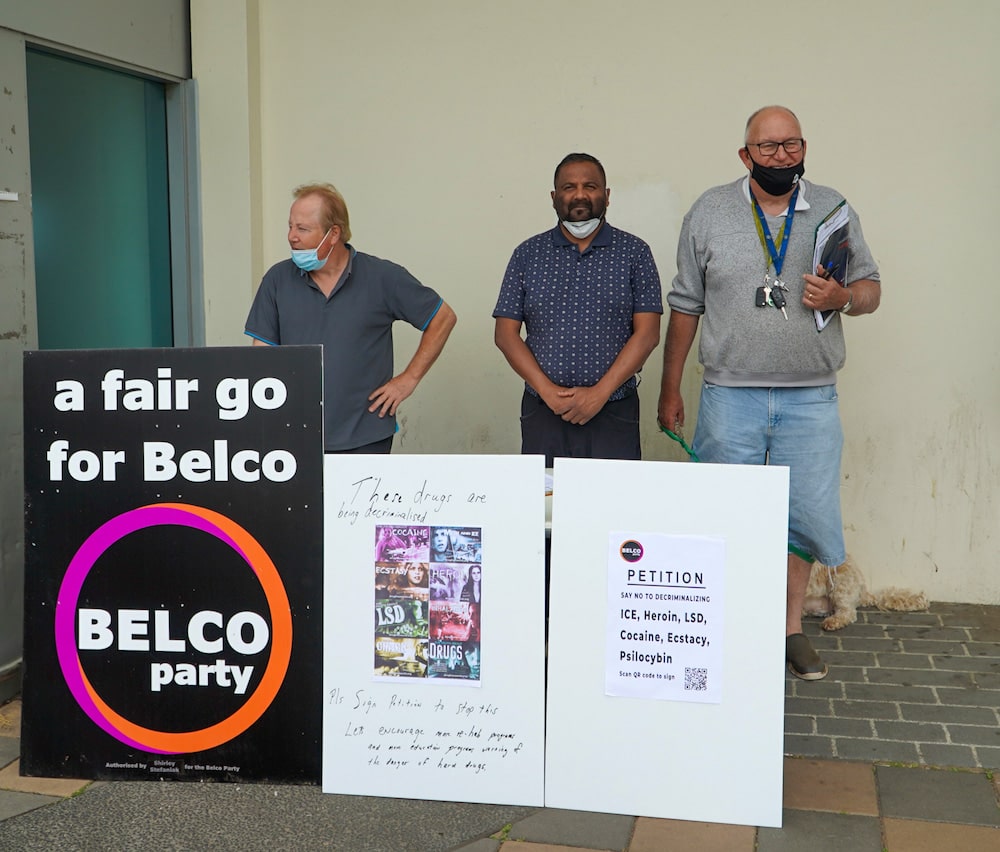Bill Stefaniak’s Belco Party, concerned about Labor MLA Michael Pettersson’s drugs decriminalisation bill, presented a petition signed by nearly 600 Canberra residents to the Legislative Assembly on Friday. The bill was sponsored by Liberal MLA Jeremy Hanson.
“This is a self-indulgent, decadent bill that, far from helping drug users, will create more of them, as it gives a green light to potential users to take up drug use,” Mr Stefaniak said.
- Police, Bill Stefaniak claim drug decriminalisation will increase crime (11 June)
- Police should refer drug users to rehab, Stefaniak says (29 August 2021)
The ACT Government announced earlier this month that it would decriminalise possession of small amounts of some illicit drugs, including heroin, cocaine, MDMA (ecstasy), and methamphetamine (ice), for personal use, as they did with cannabis in 2020.
People caught in possession of drugs below a certain threshold will either pay a $100 fine or be diverted to an illicit drug diversion program.
“The exact aim of this legislation is to treat drug dependence as a health issue rather than as a criminal offence,” health minister Rachel Stephen-Smith said.
“It’s about taking away that stigma that’s associated with drug use, so that people will be more comfortable to access the health services they need to address their problematic drug use.”
Thirty countries around the world have decriminalised drugs; Mr Pettersson’s bill was modelled on that of Portugal, which, facing an increasing rate of drug overdose deaths, decriminalised drugs in 2000 and adopted a health-focused approach; by 2014, levels of drug use fell below the European average, drug use among young people declined, and crime rates fell.
- Church hails ACT drug decriminalisation bill as a breakthrough (February 2021)
- Drug peak body welcomes Pettersson’s decriminalisation bill (December 2020)
But opponents of the ACT Government’s decriminalisation scheme are not convinced. Drug Free Australia, a lobby group with ties to conservative Christian groups, argues that Portugal’s policy was an abject failure, while AFP Commissioner Reece Kershaw claimed that crime increased there, just as the Netherlands’ soft drug policy led to narco-tourism.
- Police chief: Decriminalising drugs would make society ‘far more dangerous’ (17 February)
- ACT drug decriminalisation push hits cul-de-sac (27 January)
“This bill will almost certainly lead to more deaths and more drug-fuelled crime in Canberra,” Mr Stefaniak said.
“Other places overseas – including various US states – have found this out the hard way. In California, 40 per cent of the population want to move because of relaxed drug laws. In Ohio, before hard drugs were decriminalised, there were fewer than 250 deaths a year from overdoses. After that state introduced a similar bill, the number rose to over 600 per annum.”
Mr Stefaniak believes the government must ditch the bill and amend the Drugs of Dependence Act 1989 by putting in clauses that compel police to divert offenders to a drug rehab program and force the government to run anti-drug campaigns in schools and in the media. The government should also make sure drug rehab programs are available for addicts.
“Where are the educational programs which were meant to go with this bill, and where are the clauses to ensure people go to rehabilitation? Where are the programs they can go to?” Mr Stefaniak said.
Belco party member Alan Tutt said his doctor told him the bill would create more drug addicts.
“It will do nothing to help the problem, just make it worse. [My doctor] said the local medical profession were not in favour of it. I say to the Assembly: please don’t pass it.”
Nikolai Jermolajew, another Belco Party member, and a father of three children, said police dreaded the bill coming into effect.
“Their job is hard enough now, they are under-resourced, and they know this will just encourage dealers to be more active. Police divert people to rehab already.
“Police say this bill is unnecessary, and their chief of police has said it will lead to narco-tourism.
“I ask the ACT government: Why don’t you listen to professionals who know what is happening out there on the street in real life?,” Mr Jermolajew said.
Ms Stephen-Smith said that people in the medical field to whom she spoke supported the government’s objective of harm reduction and minimisation.
To reduce supply, ACT Policing will continue to take strong action against people trafficking and dealing in illicit substances, she said.
The government will delay implementation of measures for 12 months to train police on the new law, and ensure a community education campaign around the harms of illicit drugs, and what the law entails.
Ms Stephen-Smith said drug addicts were often victims of trauma, who needed support, understanding, and acceptance to access health services. Others experimented with recreational drugs, “largely not doing any harm to anyone other than themselves”.
Safe access to health services would educate them to understand the risk of harm from drugs, or to use drugs more safely.
The ACT had one of the highest levels of diversion by police for drug possession in the country, Ms Stephen-Smith said, but the most vulnerable people in the community, Aboriginal and Torres Strait Islander people, were less likely to be diverted, and more likely to be crimnialised as a result of their personal drug use.
“We need to change that,” she said. “We need to change our response to the personal use of drugs…
“Criminalising drug use does not stop drug use. All it does is create stigma and prevent people from accessing the services they need to address the harms in their lives.”



